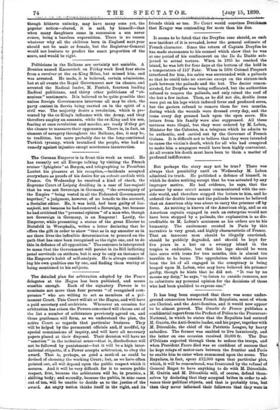The detailed plan for arbitration adopted by the Peace delegates
at the Hague has been published, and seems sensible enough. Each of the signatory Powers is to nominate not more than four persons "of recognised com- petence" who are willing to act as members of a pei- manent Court. This Court will sit at the Hague, and will have a paid secretary and archivists. Whenever an occasion for arbitration has arisen the Powers concerned will choose out of the list a number of arbitrators previously agreed on, and these gentlemen will form, as we understand the plan, the active Court as regards that particular business. They will be helped by the permanent officials and, if needful, by special commissions of inquiry, and will have all necessary papers placed at their disposal. Their decision will have no "
sanction" in the technical sense—that is, disobedience will not be followed by punishment—but it will be a high inter- national etiquette, if a Power accepts arbitration, to obey the award. That is, perhaps, as good a method as could be devised of choosing the working Court ; but, as we have often pointed out, all will depend upon the public respect which it secures. And it will be very difficult for it to secure public respect, first, because the arbitrators will be, in practice, a ; shifting body; and secondly, because the public, in nine cases out of ten, will be unable to decide as to the justice of the award. An angry nation thinks itself in the right, and its friends think so too. No Court would convince Dutchman that Kruger was contending for more than his due.






































 Previous page
Previous page